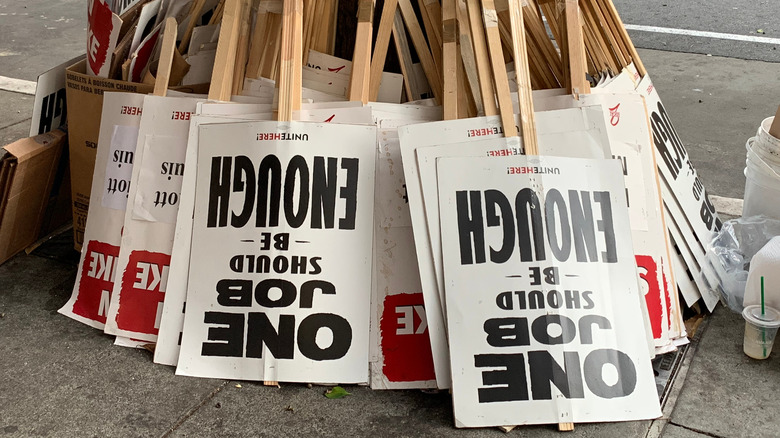California's New Fast Food Law Faces Lawsuit From Restaurant Coalition
"Power to the People" has emerged as a perhaps unlikely (yet tremendously exciting) theme of 2022. Starbucks Workers United has successfully unionized 270 stores this year (via Twitter). The staff of The New York Times recently staged a mass walk-out after seeing fair pay contract negotiations stalled. Rail workers and Amazon employees have been speaking out against unfair working conditions (via NBC and The Guardian). Now, it's California fast food workers' turn to have a seat at the table. At least, it was ...
Since September when The Fast-Food Accountability and Standards Recovery Act (aka the FAST Act or Assembly Bill 257) was passed, it has been the subject of major controversy. According to California Legislature, the minimum wage for California fast food workers would be increased to a yet undetermined amount that won't exceed $22 an hour. The law would also establish a Fast Food Council of 10 workers and advocates to enforce and adapt industry labor regulations moving forward. In opposition to California's law, some restaurants formed the Protect Neighborhood Restaurants (PNR) Coalition. PNR argues that the FAST Act will do more economic harm than good, saying it paints an inaccurate, unflattering picture of California restaurateurs, via QSR. In response, Sacramento fast food workers have protested right back, organizing a series of rallies and large-scale strikes. AB 257 was scheduled to take effect on January 1, 2023. But now, in the saga's latest development, California's new fast food law is facing a lawsuit from another local restaurant coalition.
A labor system in conflict
Per Nation's Restaurant News, the Save Local Restaurants Coalition (SLRC) drafted a petition against the FAST Act. Even though the petition collected over 1 million signatures, more than enough to postpone the law's ratification until November 2024, California's Department of Industrial Relations disregarded it. Now, in what appears to be a last-ditch effort, SLRC has launched a lawsuit to stall the new law from being enacted – and it worked. AB 257 will be revisited at a hearing on January 13. SLRC argues that the court's initial dismissal of the petition violated democratic procedure. This postponement, says a statement, "protects the voices of over one million California voters who exercised their democratic right in asking to vote on a piece of legislation before bearing its burden." The debate does bring up the question of whether local restaurants are in danger, but (perhaps more importantly) it pokes holes in a labor system that relies on lower-wage employees to function.
CNBC reported in 2021 that the tightness of the labor market gave some power to workers, who suddenly have more leverage against employers. Yet, Glenn Spencer of the U.S. Chamber of Commerce says the main motivation behind 86-ing AB 257 is that "we're concerned it could spread to other parts of the country and to other industries." If anything, maybe the reverse is probably true as California workers drew inspiration from the labor movement sweeping America in 2022. In other words: Perhaps it's too late.

